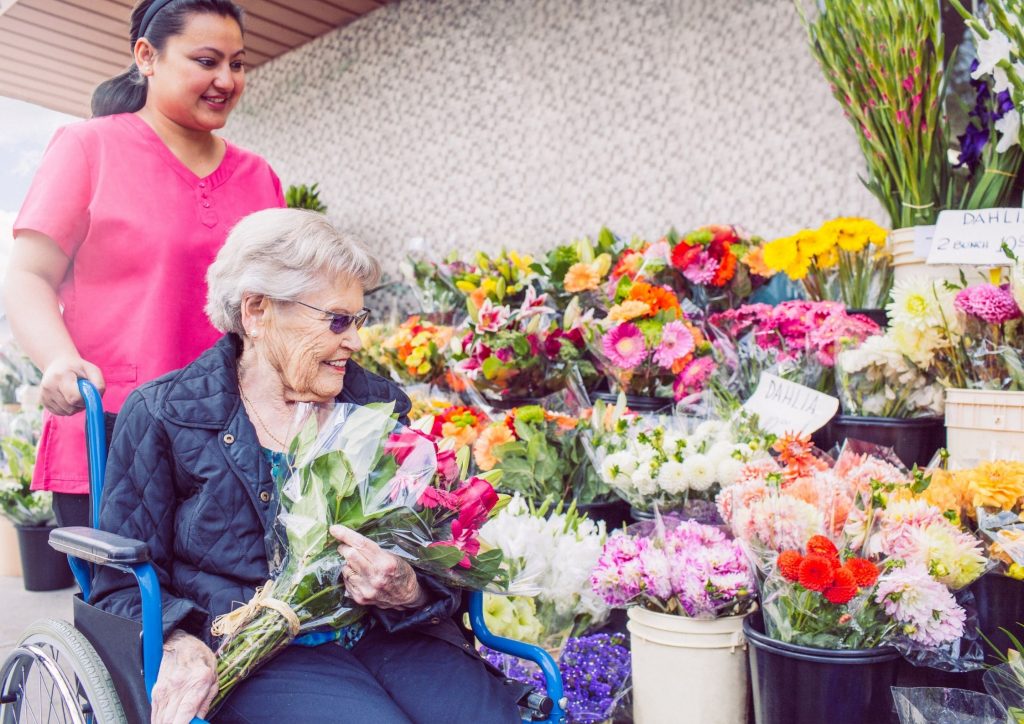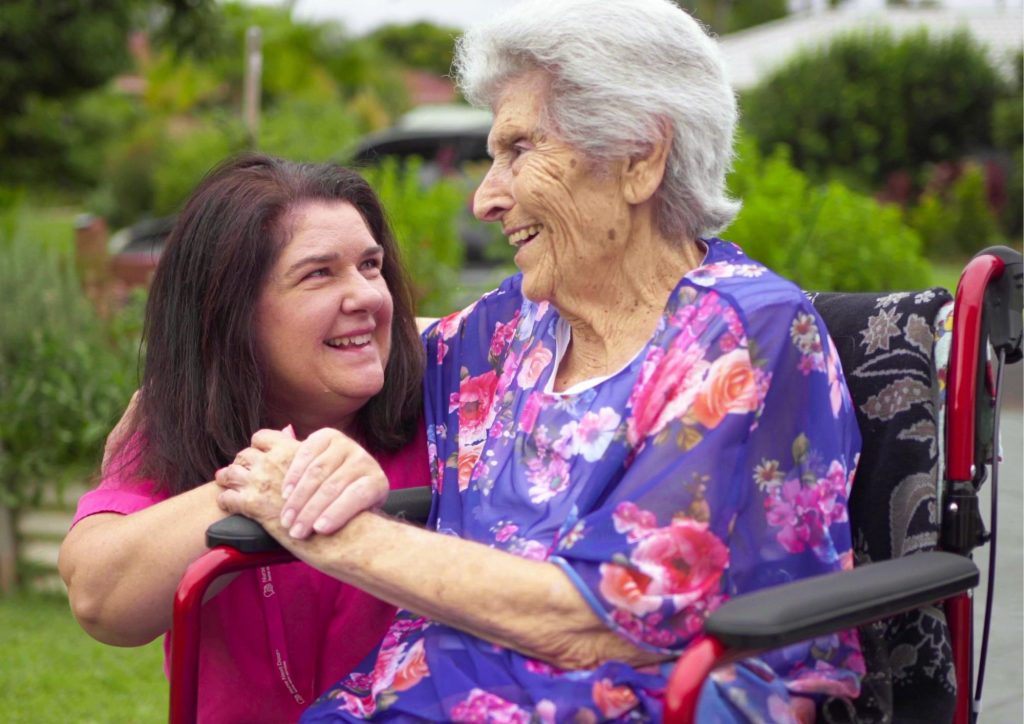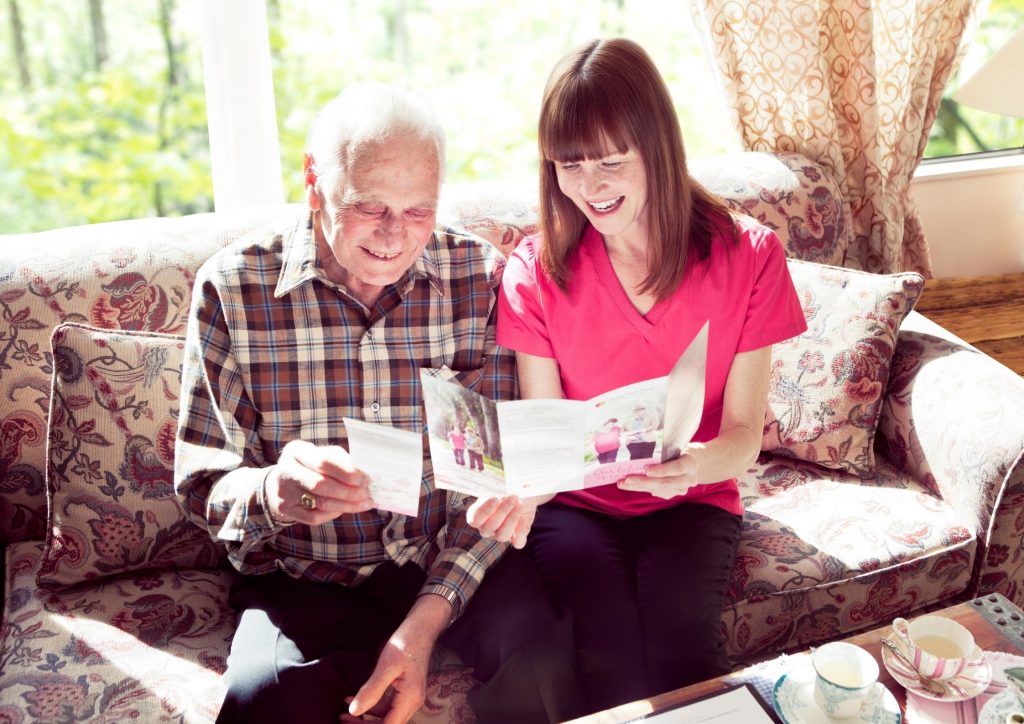Caring for Someone with Alzheimer’s and Other Forms of Dementia
“Caregiving often calls us to lean into love we didn’t know possible.” —Tia Walker
Caring for someone living with Alzheimer’s or other forms of dementia can be a challenging and emotional journey. We know that Alzheimer’s and dementia care can be difficult for family caregivers, which is why it is important to understand the needs of people with Alzheimer’s or other forms of dementia and provide your loved one with the necessary care and support while ensuring you are feeling just as supported.
Here are 5 Alzheimer’s and Dementia Care Tips to help you support your loved one in navigating through dementia and ensuring that you, as a family caregiver, can also focus on your well-being so you can continue to maintain meaningful connections with your loved one while reducing the risk of burning out.
1. Create a Safe Environment
2. Maintain a Routine
3. Communicate Effectively
4. Engage in Stimulating Activities
5. Seek Support Services


Understanding Alzheimer’s and Other Forms of Dementia
Dementia is a progressive condition that affects brain function, memory, thinking, and behaviour, making it difficult for people with the condition to perform daily tasks. Dementia is caused by damage to brain cells, which can be due to a range of factors including age, genetics, and lifestyle.
The most common type of dementia is Alzheimer’s disease, which accounts for around 7 in 10 people who are affected by dementia in Australia. Other types of dementia include vascular dementia, Lewy body dementia, and frontotemporal dementia.
Psychological symptoms of dementia may vary depending on the type and stage of dementia, but they often include:
- Memory loss
- Difficulty with communication
- Mood swings and behavioural changes
- Confusion and disorientation
- Difficulty with daily tasks
- Problems with judgment and decision-making
- Changes in personality and interests


Managing Psychological Symptoms of Alzheimer’s and Other Forms of Dementia
While there is currently no cure for dementia, there are ways to manage symptoms and improve the quality of life of your loved one. Here are some strategies for managing common symptoms:
Memory Loss
Memory loss is a common early sign of dementia which can cause a decline in an individual’s cognitive abilities. This can significantly impact a person’s daily life and overall well-being. As memory loss progresses, individuals with dementia may struggle to remember names, faces, recent events, and even familiar surroundings.
As a family carer, witnessing your loved one suffer from memory loss can be very difficult to accept as a new norm. It is important to know that the severity of the memory loss will depend on the type and stage of dementia but there are small things you can do to better help manage this symptom with your loved one:
- Use memory aids such as a whiteboard or reminder notes
- Stick to a consistent daily routine so your loved one knows what to expect during the day
- Encourage physical activity and exercise


Communication Difficulties
Communication is a fundamental part of human interaction, allowing us to connect, understand, and express ourselves. However, for individuals living with dementia, communication can be incredibly challenging. Dementia can make it difficult for them to express themselves effectively and absorb information efficiently that is communicated by others.
It can be extremely difficult, and at times frustrating, to communicate effectively with your loved one. The below alternative forms of communication can help improve your connection with your loved one and enhance their quality of life because they can continue to feel understood and heard while they try to navigate through the changes in their own communication style:
- Use simple language
- Avoid distractions
- Use visual cues such as photographs and gestures
- Encourage nonverbal forms of communication, such as drawing or writing


Behavioural Changes
People living with dementia can encounter a range of behavioural changes that pose challenges both for them and their caregivers. These behavioural shifts can be very mild or very severe behaviours, ranging from agitation and confusion to withdrawal and aggression.
These changes not only disrupt their daily life but also demand compassionate understanding from family and friends of the underlying causes dementia has on cognitive ability.
Seeing these shifts in the behaviour of your loved one can bring an overwhelming sea of emotions over you, as a family caregiver, but there are some things you can do to help them and yourself through these changes:
- Continuously identify triggers for behavioural changes and try to avoid them
- Use positive reinforcement and rewards for good behaviour
- Provide a safe and calming environment


5 Alzheimer’s and Dementia Care Tips
Often the path forward can be uncertain when it comes to dementia care but there are things you can do for your loved one to ensure that they can continue maintaining a quality life while you learn how to navigate the changes in your loved one’s memory, mood and behaviours.
Here are 5 Dementia Care Tips for caregivers to assist them in supporting a person living with dementia.
1. Create a Safe Environment
People with dementia may struggle with mobility and balance, making them more susceptible to falls so it’s important to ensure that your loved one is living in a safe environment.
Creating a safe environment for someone living with dementia requires a thoughtful and proactive approach. By identifying and mitigating potential hazards, caregivers can significantly reduce the risk of accidents and enhance their loved one’s overall well-being.
Start by decluttering living spaces to minimise confusion and provide clearer pathways. Installing grab bars and handrails in key areas, such as bathrooms and hallways, can offer vital support. Effective lighting that reduces shadows and glare can also alleviate disorientation. Securing potentially harmful items, such as sharp objects and cleaning supplies, is essential. Additionally, consider using locks or alarms on doors and windows to prevent wandering.
Regularly reassessing the environment as your loved one’s needs change ensures an ongoing commitment to safety and comfort in their day-to-day life.


2. Maintain a Routine
Dementia can disrupt the sleep patterns of people with the condition, leading to confusion, agitation, and irritability. Maintaining a consistent routine for someone living with dementia can provide a sense of stability, security and comfort amidst the challenges of cognitive changes.
Establishing a structured daily schedule with familiar activities can help reduce anxiety and confusion. Incorporate tasks that your loved one enjoys and can engage with, such as simple exercises, hobbies, or listening to music. Using visual cues, like a large clock or a whiteboard, can assist in conveying the day’s activities. Keep mealtimes and bedtime consistent to regulate their body clock.
Flexibility in maintaining a routine is key, you will need to be prepared to adapt the routine as needed while prioritising a calm and reassuring atmosphere.
By committing to a routine tailored to their preferences and abilities, you can empower your loved one to navigate their days with a greater sense of control and comfort.


3. Communicate Effectively
Communication can be challenging for people with dementia, as they may have difficulty processing information and expressing themselves. Communicating effectively with someone living with dementia requires patience and empathy.
Using simple and clear language, accompanied by gentle gestures and facial expressions, can facilitate understanding with your loved one. Maintaining eye contact and speaking in a calm and unhurried manner fosters a sense of connection. Allow ample time for your loved ones to process and respond to information. Active listening is also crucial; validate their feelings and acknowledge their thoughts, even if they seem fragmented.
Avoid arguing or correcting inaccuracies, as this can lead to frustration. Instead, join your loved one’s reality and engage in their conversations with genuine interest. Non-verbal cues like touch and smiles often convey emotions better than words alone.
By embracing these communication strategies, you can bridge the gap between words and emotions, enhancing the quality of interactions and nurturing a sense of dignity and connection for your loved one living with dementia.


4. Engage in Stimulating Activities
Cognitive function is greatly affected for someone living with dementia so it’s important that your loved one can feel a sense of purpose and enjoyment in their day-to-day life. Engaging in stimulating activities can be a lifeline of joy and connection for individuals living with dementia while maintaining cognitive function and improving their mood.
Whether it’s crafting, gardening, or revisiting old hobbies, these moments become bridges between the past and the present. The key is to keep it simple, allowing for a sense of accomplishment without overwhelming your loved one. Think of activities that tap into their interests and skills, and don’t be afraid to get a bit creative. Music, art, or even gentle exercises can spark a glimmer of recognition and excitement.
In these moments, the shared smiles and sense of achievement for your loved one become the real milestones.


5. Seek Support Services
Caring for someone with dementia can be emotionally taxing and overwhelming but it’s important to understand that you are not alone. There are plenty of dementia support services, such as Nurse Next Home Care Services, which can offer person-centered care and clinical support for when you need to take a break from being a family caregiver to your loved one living with dementia.
Other types of support you and your loved one can tap into include family, friends, support groups and resources such as Dementia Australia, Dementia Support Australia and The National Dementia Helpline, a free and confidential service, are also available to help manage grief following a dementia diagnosis and guide you on how to care for your loved one as they navigate through a new norm while living with dementia.
Remember, reaching out when you need support doesn’t imply that you are not able to support your loved one through dementia, but rather, it’s a testament to your dedication to their well-being.
Whether it’s practical advice, emotional encouragement, or simply a listening ear, seeking support creates a safety net that allows both you and your loved one to work through the challenges of dementia together.


Dementia care requires patience, empathy, and understanding; it is a challenging but rewarding experience. By understanding the condition and its symptoms, creating a safe environment, maintaining a routine, communicating effectively, engaging in stimulating activities, and seeking support, family caregivers can manage the physical and emotional demands of caregiving for their loved ones living with dementia and navigating through a new norm.
At Nurse Next Door Home Care Services, we are passionate about Making Lives Better.
Contact us today on 1300 600 247 to discuss how our qualified Nurses and Caregivers
can help you keep doing what you love.
